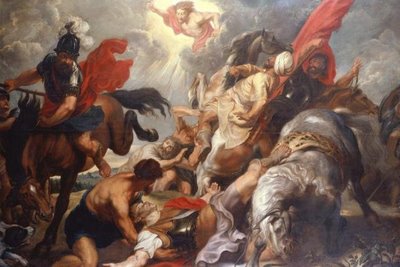|
|
Online Poems |
|
Enid Dame, "The Road to Damascus, Maryland" . . .
|
Instructor's note: The poem's title alludes to the Bible's New Testament Book of Acts concerning the conversion of Saul, a persecutor of Christians, to the Apostle Paul while journeying on the Road to Damascus (in present-day Syria). The Book of Acts (ch. 9) relates: "As he [Saul / Paul] journeyed he came near Damascus, and suddenly a light shone around him from heaven. Then he fell to the ground, and heard a voice saying to him, “Saul, Saul, why are you persecuting Me?” And he [Saul / Paul] said, “Who are You, Lord?” Then the Lord said, “I am Jesus, whom you are persecuting. . . . " Relevance of Paul's conversion to American Immigrant Literature: An immigrant's assimilation to an American may be analogous to a religious conversion experience. According to St. Paul's writings, a convert must give up his or her old self and be reborn as a new soul; e.g. Paul's Letter to Ephesians 4.22: "You were taught, with regard to your former way of life, to put off your old self . . . ." Analogously, in "What is an American?" (1782), Crevecoeur writes, "He is an American, who leaving behind him all his ancient prejudices and manners, receives new ones . . . . The American is a new man, who acts upon new principles . . . " (3.6-3.7). Maps of Damascus, Syria, and Damascus, Maryland at bottom of page. |
Peter Paul Rubens (1577-1640),
|
Discussion Questions:
1. The poem's author is ethnically a Jew but also an American. Comparably Saul / Paul was a Jew (as was Jesus), but Saul / Paul was also a citizen of Rome, itself a prototype of modern Western culture or civilization. How can one rationalize and defend Dame's use of a Christian story to describe her own personal, secular, or Jewish experience as an American?
2. Most immigrants to America can't imagine how much change they're buying into. Do the changes involved in becoming an American ever end? How does Dame's poem below raise or answer this question? Is the status of "American" ever status quo or stable, or must all Americans constantly change their identities to keep up with revolutionary changes in technology, the marketplace, social or family values, etc.?
3. The poem ends with a reference to "new names," which necessarily alludes to Saul's conversion to Paul. How much are "new names" always a part of the American experience generally or of immigration in particular? Even if the name "American" doesn't change, does the meaning of "American" change?
3a. Besides names, what other symbols of assimilation, class, ethnicity, etc.?
4. How is the poem humorous? Consider hyperbole, anticlimax, irony, diminution, incongruity, presence of food, etc. How does the situation of a middle-aged woman riding in the back seat of her parents' car humorously present some of the problems posed by the infinite choices and changes presented by America.
4a. Does "dreamily" (l. 28) implicate the American Dream?
4b. If "extended childhood" is a marker for upper-class or bourgeois security, what is an American attitude toward an extended childhood like that of the poem's speaker?
![]()
The Road to Damascus, Maryland
(1980)
by Enid Dame (1943-2003)
On the road to
Damascus, Maryland,
between the trailer
camps and rosebushes
I had a vision
in the back seat
of my parents' car.
Once again,
it was happening.
I felt myself
turning
into someone else.
I wasn’t sure who,
yet.
My parents were
worried.
Next week I’d be 35
and I still didn’t
seem
to know who I was.
At other times
I’d already been:
a New York Jew,
a radical teacher,
an Ethical
Culturist,
a barefoot
breadbaker,
a nice girl
in knee socks
I was relieved
when they changed
the subject
to where we’d eat
lunch
in Damascus.
I sat in the back
seat
dreamily
making a list
of new names.
 Damascus, Syria |
 Damascus, Maryland |

